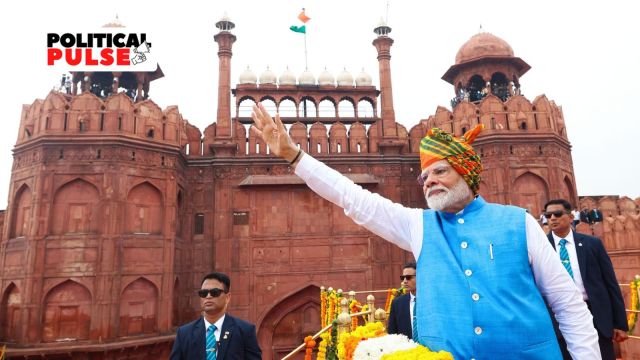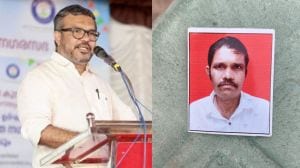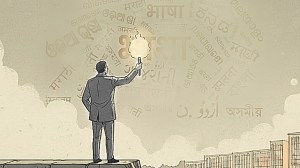In 2019, delivering his first I-Day speech after returning to power, Prime Minister Narendra Modi, in the context of abrogation of Jammu and Kashmir’s special status under Article 370 barely 10 days earlier, had said that the “specific character” of his government was that “we neither defer problems nor do we let them fester.”
Modi was emphatic: after all, his government with 303 MPs, had fulfilled one of the three planks at the core of its agenda, the other two being Uniform Civil Code and Ram Temple. With the construction of Ram Temple too having been accomplished, Modi, in his first I-Day address of his third term, mentioned UCC. But the way he framed it, saying it was time for a “secular” code to replace the “communal” one reflected the changed political reality.

2024 is not 2019, the Modi government needs the numbers from TDP, JD(U) and the LJP, all of whom have a Muslim support base albeit in varying proportions. Issues like UCC or, for that matter, one nation, one election, aren’t high on their agenda. Despite this new reality, Modi has underlined that UCC is very much on the table.
What stands out is his framing, his mention of the Supreme Court and the observation that let there be extensive discussion on this “serious issue” and let diverse opinions come in. Both TDP and JD(U) have, in the past, spoken about the need for in-depth discussions and consensus building in the context of UCC. Hence, Modi has reframed UCC as a secular civil code.
Cut to 2019 again.
Talking about the triple talaq law which his government had passed, Modi, in his 2019 I-Day address, had said: “We have taken this important decision in the spirit of India’s democracy and constitution, to respect the thinking of Baba Saheb Ambedkar so that our Muslim sisters get equal rights…They guarantee lasting protection to our mothers and sisters.”
The BJP has always been contemptuous of the “secularism” plank of its opponents, especially the Congress, and has often accused them of indulging in appeasement of Muslims in the garb of secularism. In fact, Modi himself has over the years defined secularism in terms of his government’s schemes arguing it does not discriminate between religions and castes and that the benefits have touched all. In that context, he has often spoken about BJP’s slogan of sabka saath, sabka vikas. He reiterated that Thursday as well.
But today he did not use the word secular in a derisive tone. Rather, he used it as a synonym for non-discrimination. He said the Supreme Court has repeatedly addressed the issue of the Uniform Civil Code.
Story continues below this ad
“Numerous orders have been issued, reflecting the belief of a significant portion of our population—and rightly so—that the current civil code resembles a communal civil code, one that is discriminatory. As we celebrate 75 years of the Constitution, we must hold extensive discussions on this subject as the Supreme Court advocates for this change. And it is our collective responsibility to realize the vision of the framers of our Constitution. We should welcome diverse opinions and perspectives. Laws that divide our nation based on religion and foster discrimination have no place in modern society. Therefore, I assert that it is time for the country to demand a Secular Civil Code. After 75 years of a Communal Civil Code, it is crucial to move towards a Secular Civil Code. Once this shift takes place, it will eliminate religious discrimination and will bridge the gap felt by ordinary citizens,” he said.
In his 2019 speech, Modi had spoken about the idea of holding simultaneous elections and the debate around it. He had said that the discussion on the topic should be taken up in a democratic manner. By the end of his second term, the Government was in receipt of the report of a high-level committee headed by former President Ramnath Kovind on the roadmap for implementation of one nation, one election.
Modi’s speech had clear political undertones. He mentioned the word “youth” 25 times and about his government’s policies having created employment opportunities and jobs as many as 10 times. He spoke about farmers 16 times, women 14, Dalits six times and Tribals and oppressed, exploited and deprived sections four times. He mentioned the Constitution eight times.
Interestingly, he also framed his rhetoric around dynastic politics differently this time. Rather than calling out the Opposition on this, which has been his refrain, he spoke about the resolve to open the doors of politics to 1 lakh youngsters with no political background.
Story continues below this ad
“We want fresh blood, 1 lakh such talented young people, whether they come into the panchayat, municipal corporations, district councils, state assemblies, or the Lok Sabha. We want new young people with no previous political history in their families to enter politics so that we can be freed from casteism and dynastic politics thereby enriching democracy,” he said.
“It is not necessary that they join a particular party; they should join whichever party they prefer and become representatives. The country should decide that if 1 lakh such young people, whose families are far removed from politics enter the system in the near future, it will lead to new thinking and new capabilities while also enriching democracy. Therefore, we need to move in this direction,” he said.

































